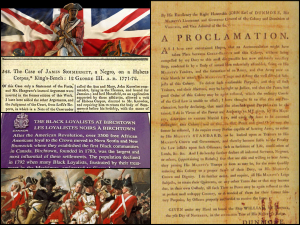Before the start of the American Revolution, the South was much more closely linked to Britain than the North. The southern white landowners, who held nearly all of the political power, were almost universally English and Anglican. The majority of other whites in the South were also from Britain. Why, then, did the South join with the North in the Revolution? After all, the South also had very close economic ties to mother England. Much of the answer can be found in decisions made by the British regarding the status of slavery and slaves in the early/mid-1770s.
The first major event that began to change the minds of Southerners about the Northern agitation for independence was the Somerset decision of 1772. This decision, which sprung from an American slave escaping from (and then being recaptured by) his master while in Britain, completely changed British common law by disallowing the recapture of escaped slaves and stating that the institution of slavery was incompatible with the British legal system. The word of this decision spread rapidly in the South, where many aristocratic landowners’ sons were lawyers. Logically, these Southern lawyers believed that the Somerset decision meant that Britain would soon force emancipation on the American colonies. This unsurprisingly did not sit well with the majority of whites in the south. The rich whites were concerned of the economic impact of the emancipation of the slaves and the loss of free labor, while the poor whites were concerned about the social impact of emancipation when slaves accounted for nearly 50% of the population in some southern colonies.
The second major event that pulled the South further away from Britain was the Dunmore Proclamation of 1775. The Revolution had just begun, and Lord Dunmore declared martial law in Virginia and said that slaves who left their masters in order to fight for the British would be emancipated. About one hundred fifty thousand slaves, including women and children, took Lord Dunmore up on his offer. For Southerners, this was the last straw. They saw the Dunmore Proclamation as a way for the British government to incite slave revolts in the colonies. After the Dunmore Proclamation, the South became more committed to the cause of revolution, as it had almost become personal to them. The Dunmore Proclamation earned King George III the nickname of the “sceptered savage” in the colonies, revealing how strongly they felt about both the king and Native Americans. After the conclusion of the Revolution, the British government compensated American planters who lost slaves as a result of the Dunmore Proclamation, but this was too little, too late, and failed to change Southerners’ opinions about Britain.
Here is the first blog post, comments are due by 11:59 pm on Sunday the 14th…400-500 words…have fun..
